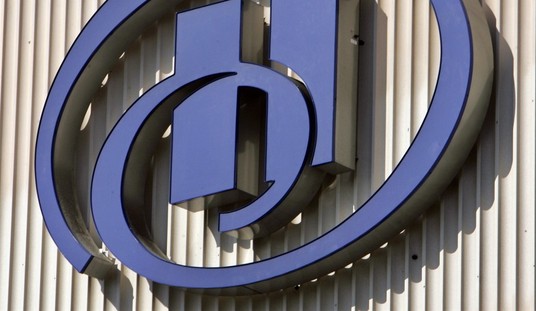Actually, the federal deficit is already almost at $1 trillion for FY2011 after just eight months, as The Hill reports this morning (via Instapundit):
Still, through eight months of the 2011 fiscal year the nation is facing its third straight $1 trillion-plus deficit — totaling $927.4 billion so far compared with $935.6 billion during the same period in 2010, about $8 billion less, according to the report.
Taking the average of eight months and extrapolating it out to the end of the fiscal year, we will run a deficit of $1,391,100,000,000 by September 30th. That will be the third straight year of trillion-dollar deficits under Barack Obama and Democratic budgets.
Democrats claim that the problem comes from a lack of revenue, but that’s clearly not the issue:
Receipts totaled $175 billion in May, up 19 percent and nearly $30 billion higher than the same period last year while outlays were $233 billion, about $50 billion less than a year ago, according to the Treasury’s monthly budget statement. …
Total receipts for the fiscal year are $1.5 trillion, about 10 percent higher than last year, with outlays standing at $2.4 trillion, about 6 percent above last year’s levels.
So far this year, individual income tax payments were up 28 percent to $701.8 billion, while corporate tax receipts increased 5 percent.
Averaging and extrapolating the receipts shows a revenue stream for FY2011 of $2.25 trillion. That’s $335 billion less than in FY2007, when we ran a deficit of $160 billion. Had we ended up with a deficit of $500 billion, one could explain it as a result of loss of income. The deficits have run more than four times the revenue shortfall, however, which means that it’s the spending that drives the deficits — as anyone with a calculator could guess.
Democrats have a plan to resolve the economic stall that caused the revenue shortfall, however. Care to guess what it is?
Senior Senate Democrats are growing frustrated by what they see as President Obama’s passivity on the economy, and are beginning to discuss a large infrastructure package funded by tax increases.
Some Democrats, such as Iowa Sen. Tom Harkin, who serves as chairman of the Health, Education, Labor and Pensions Committee, think such a package could lower the unemployment rate by as much as two percentage points. …
“The last election was about jobs and the economy, and now we’re in a position where we really do need some economic pump-priming by the federal government,” he said.
Er, didn’t we already do the “economic pump-priming” in 2009? That’s when Democrats presented a blank check to Barack Obama of almost $800 billion to prime the economic pump, the amount he requested and the amount that his economic team said would keep unemployment down below 8%. It hasn’t reached 8% since, but not because joblessness hasn’t gotten that high — but because it hasn’t gotten that low, not even with record flight from the workforce. As the numbers above show, government spending is still rising well above the rate of inflation (actually closer to four times the rate of core inflation), and it’s not spurring a massive job-creation spree now.
In fact, another stimulus package is more likely to damage long-term prospects of job creation, especially considering how Democrats plan to fund it:
Conrad estimates the Treasury loses about $1.1 trillion in revenue a year in special tax breaks — or what some Democrats call tax expenditures. Some of these tax breaks — subsidies for oil companies and breaks for companies that relocate factories overseas, for example — could be ended to fund infrastructure projects.
“We have a significant shortfall in the trust fund to pay for transportation. How do you pay for it? You got to pay for it with other spending cuts or additional revenue,” Conrad said. “I would prefer to go after offshore tax havens to pay for it.”
Yes, by all means, let’s raise taxes to fund “infrastructure,” even though massive spending on infrastructure gained us nothing from the 2009 spending spree. Hiking taxes on producers means higher prices for consumers, job losses in the industries targeted, or a combination of both. Raising taxes on oil companies will mean higher prices not just at the pump, but across the retail sector. That will slow demand, which will mean fewer permanent jobs even if construction jobs get a temporary boost. The economic impact of gas-price increases should have made that rather obvious, even to tax-and-spenders like Harkin and Conrad.
The popular definition of insanity is doing the same thing over and over again and expecting a different result. Another dive into the empty Keynesian pool is practically as insane an economic policy as one can imagine after the flop of the Obamanomics “recovery.”
Update: Investors Business Daily also wonders at the sanity of Democrats in Congress:
Has Harkin been asleep for the past two years? Doesn’t he remember that Democrats already pushed through $830 billion worth of “pump priming”? And that this was supposed to stimulate growth and hold unemployment under 8%?
Instead, quarterly GDP growth has averaged an anemic 2.8% since the recession officially ended two years ago, and unemployment has been at or above 9% for all but two of the past 24 months.
Indeed, few ideas have been so thoroughly discredited as the one that says more government spending will increase jobs. As the chart above shows, government outlays climbed more than 40% between 2006 and 2011. At the same time, the employment figure has dropped by almost 5 million.
The Cato Institute’s Mark Calabria, who pulled the data together for the chart, is quick to point out that just because there’s a correlation between rising government spending and falling jobs doesn’t mean there’s a causal relationship.
However, he says, it does “suggest to me that continued massive government spending is not going to turn around the job market.”







Join the conversation as a VIP Member